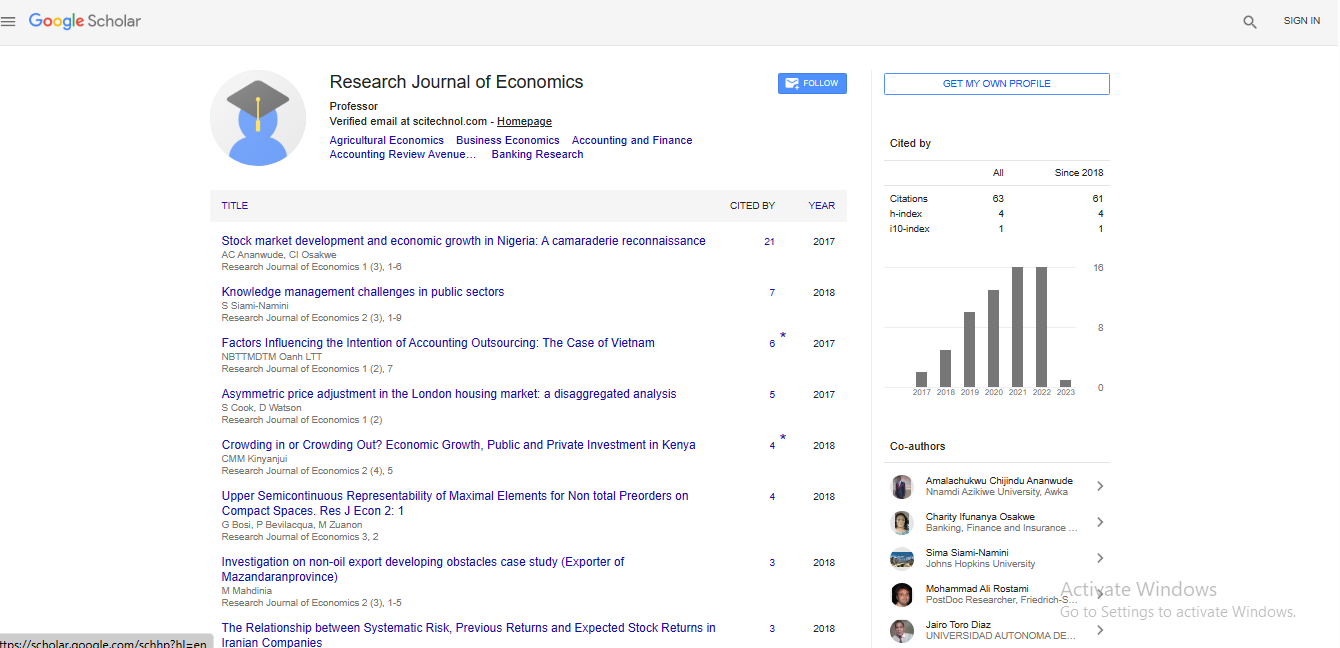Commentary, Res J Econ Vol: 8 Issue: 1
Budgeting: Resources to Execute Initiatives
Wnchaei Wank*
Department of Applied Economics, Fudan University, Fudan, China
- *Corresponding Author:
- Wnchaei Wank
Department of Applied Economics,
Fudan University,
Fudan,
China;
E-mail: wuchaei_wank@gmail.com
Received date: 04 November, 2023, Manuscript No. RJE-23-119226;
Editor assigned date: 06 November, 2023, PreQC No. RJE-23-119226 (PQ);
Reviewed date: 20 November, 2023, QC No. RJE-23-119226;
Revised date: 15 July, 2024, Manuscript No. RJE-23-119226 (R);
Published date: 22 July, 2024, DOI: 10.4172/RJE.1000171
Citation: Wank W (2024) Budgeting: Resources to Execute Initiatives. Res J Econ 8:1.
Description
Budgeting is the act of creating and managing a financial record that forecasts revenue and spending for a given time period. Budgeting is a critical ability for company owners, executives, and managers to ensure that organizations and teams have the resources they need to execute initiatives and achieve goals.
A simple budget includes predicted revenue and spending for a specific time period (for example, the future quarter or year). After expenditures are deducted from predicted revenue, the remaining funds can be allocated to projects and initiatives, ensuring that do not intend to overspend. Budgets from prior periods may be compared to the company's actual financial allocation and performance, providing insight into how accurate estimates were.
Annually, the budget division department of economic affairs of the ministry of finance prepares the budget. The finance minister chairs the budget-making committee. The current Indian finance minister. The budget contains supplemental surplus grants, and when the President issues a proclamation regarding the failure of constitutional machinery in connection to a State or Union Territory, the budget of that State is prepared.
A company's, divisions, or corporation's budget is a short-term financial prediction that aggregates the predicted revenues and costs of the various departments-operations, human resources, IT, and so forth.
It is therefore an important component of integrated business planning, with quantifiable objectives devolved to departmental managers (and becoming KP; budgets may thus also relate to non-cash resources such as personnel or time.
Everyone in the organization has an interest in the budget. Senior staff members should, at the very least, be aware of the budget, its creation, its significance, and how to keep an eye on it. If an organization consists of several departments, regions, or branches, then every branch, the budget for each department or region should be created independently. Then, these budgets must be included (consolidated) into the organization's total budget. Every division, area, or departments ought to be able to understand how their funding fits into the larger financial picture. Must keep a monthly eye on its finances. The ideal time to check finances is when those closest to the budget are accountable to the expenditure.
The budgeting process is often time-consuming and labourintensive, involving hundreds of employees; final approval is given by both the finance director and the operations director. The budget is normally prepared on a yearly basis-but in certain industries, such as mining, this may be quarterly-with continual monitoring; see financial risk management corporate finance. If the actual statistics supplied are near to those budgeted, it indicates that management understand their business and have delivered well. If, on the other side, the data diverge, it sends a "out of control" signal; moreover, when these figures have been conveyed to analysts, the share price may suffer.
Budget auditing is scrutinizing the specifics of how a budget operates and assessing its efficacy and long-term viability. While collecting data for budget reports and determining any potential misuse of funds, apply auditing abilities. Understanding financial compliance norms and regulations is also required in order to evaluate how team uses corporate money to industry standards. The audit results may be used to enhance future budgets and instruct team on best practices for tracking spending or purchases using company accounts. Budget reports forecast future financial decisions. Writing and formatting budget reports is a valuable skill for anybody who manages money as part of their job. Budget reporting skills may be used to establish financial company objectives and compare them to financial reports at the conclusion of an accounting quarter.
 Spanish
Spanish  Chinese
Chinese  Russian
Russian  German
German  French
French  Japanese
Japanese  Portuguese
Portuguese  Hindi
Hindi 